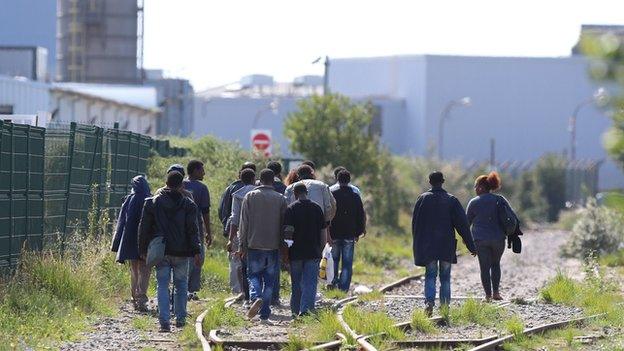Calais migrant crisis: Sending UK police ruled out
- Published
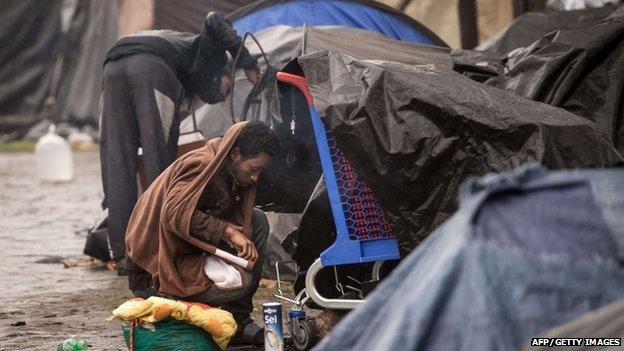
The government has ruled out sending British police to Calais to help solve the port's "tremendous problem" with illegal immigration.
James Brokenshire MP told BBC Radio 5 live that security on French soil was a "matter for the French."
Increasing numbers of migrants have been trying to enter the UK through Calais in recent months.
The French interior minister had suggested that British police could be "very useful".
Mr Brokenshire stressed this was a "Europe-wide problem", and that the UK had previously pledged £12m to help bolster security in Calais.
'No plans, no intention'
That pledge was part of a plan, announced in September by Home Secretary Theresa May, for the two countries to work more closely to tackle the problem.
But he said British police would not be sent to aid French authorities managing the camps.
"We have seconded an officer from the National Crime Agency to work with the French agency dealing with organised immigration crime.
"But we have no plans, no intention to see British police officers on French soil. Security in France is a matter for the French government," he said.
Local officials say there are now 2,500 illegal immigrants in Calais, with the majority from Eritrea, Ethiopia, Sudan and Syria.
Numbers have increased by 50% in the past year as people flee from humanitarian crises in northern and eastern Africa and the Middle East.
Many are camping or living in squats around the port and there have been clashes on the streets of the town.
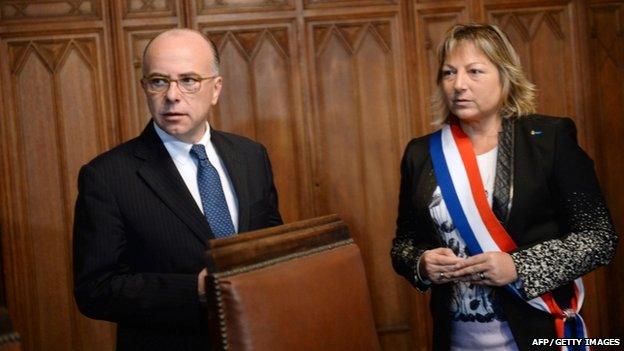
Bernard Cazeneuve with Calais mayor Natacha Bouchard
"We had a hard negotiation between the two governments and I have had a lot of rendezvous with my friend Theresa May in order to find a solution concerning this tremendous problem," Interior Minister Bernard Cazeneuve told BBC Radio 5 live's Breakfast show.
"We are both involved in this problem and we have to find common solutions in order to be efficient."
He said he and Mrs May had agreed that, in order to tackle the problem in both countries, more co-operation was needed in "services and policemen".
Last month, France sent 100 extra police officers to the northern French town to join the 350 already there. There are currently no British police there.
Mr Cazeneuve said that he and Mrs May had agreed to the installation of new security equipment at the port, and to "try to work together concerning the security aspects and the humanitarian aspects by financing a number of projects".
"We are going to finance the humanitarian aspect and the British government is going to help with financing the security aspect of the problem," he added.
Calais migrants have been protesting for better protection of their human rights and freedom. Lucy Willamson reports.
When asked if he believed British police should be sent to Calais, Mr Cazeneuve responded: "It would be very useful to have more policemen here, and we try to find a way of being in a common system here concerning police, in order to explain to all the immigrants in Calais that it's impossible to cross the Channel.
"And we'd be very happy if it would be possible to have more co-operation concerning this point."
Later the French embassy in London clarified that the minister had intended to refer to "officials" - fonctionnaires in French - and not police, in the interview which he gave in English.

'As bad as Darfur'
Rachel Burden, 5live Breakfast presenter, in Calais
"There is no religion, no colour, we live like brothers here... because we are one category, we are refugees."
This is what Adnan from Pakistan (pictured) told me as he showed me around one of the camps in the "Jungle" - the makeshift homes of up to 2,500 migrants who have travelled to Calais to try to cross the Channel to the UK.
They sleep under tarpaulins in muddy fields, strewn with rubbish.
By day they sleep, or crowd around small fires making tea or porridge. By night, they line the roads leading to the ferry, desperately trying to scramble on to any vehicles they can. In the last week, we were told, three men have been killed on the roads here.
Charities here have told us the conditions at the camps do not meet basic humanitarian needs. Medecins du Monde, which provides some food and hygiene facilities here, says it is as bad as Darfur.
Despite the hopelessness of their situation, the young men and women I met told me they had left everything behind to travel here, and have no money to go anywhere else.

The UK has said it will contribute £4m (5m euros) a year for three years to a joint intervention fund.
The increased security measures are said to include more robust fences and new technology to detect migrants hiding in lorries.
James Brokenshire has previously said British and French law enforcement agencies would also target organised crime gangs behind people trafficking and smuggling.
Calais' Deputy Mayor Philippe Mignole told BBC Radio 5 Live that the presence of British police "could be a good idea".
Illegal immigrants' daily effort to flee France
"In the past we were blamed for this but Calais cannot deal with this situation alone.
We have now in 2014 to be much more intelligent than that, and take some decisions, and work it together. And I think to have English police forces in Calais is as well one of these ideas."
He said that once migrants arrive in Calais, it is "already too late".
"We cannot let them die on the sea. I think it is all of our responsibilities."
As part of the agreement between the UK and France, the layout of the port at Calais will be changed to make it easier to carry out controls and improve traffic flow.
The money will also fund information campaigns to explain the consequences of illegal immigration to the UK and provide details on asylum in France or assisted voluntary return.
The National Crime Agency is to second a full-time officer to Ocriest, the French agency responsible for tackling illegal immigration, and the French border police will send two officers each month to work with the joint border intelligence unit in Folkestone.
'It's not El Dorado'
When the agreement was made, the BBC's Hugh Schofield said that France saw it as a "landmark deal" because, in its view, Britain had recognised that it had a responsibility for helping secure the port.
Last month, Calais Mayor Natacha Bouchart said illegal migrants saw the UK as a "soft touch" and that the country's benefits system was acting as a "magnet" to them.
"There hasn't been a message from the British government or anywhere else that it's not El Dorado," she told UK MPs on the Home Affairs Committee.
She previously threatened to shut down the port unless the British government did more to stop illegal immigration.
Shadow Immigration Minister David Hanson said on Monday French authorities should be doing more to stop migrants heading for the UK from reaching Calais in the first place.
Illegal camps have existed in the port since France closed the Sangatte immigration centre in 2002.

What security is in place?
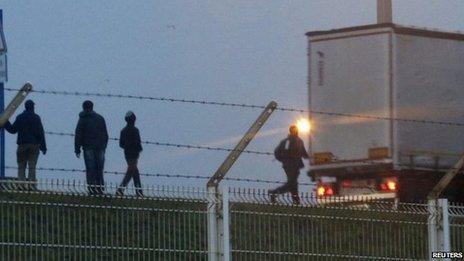
5m fence encircles the port
Security guards patrol with dogs at night
Calais Chambers of Commerce has responsibility for port security
UK Border Force present inside port and carry out passport checks on passengers

- Published2 November 2014
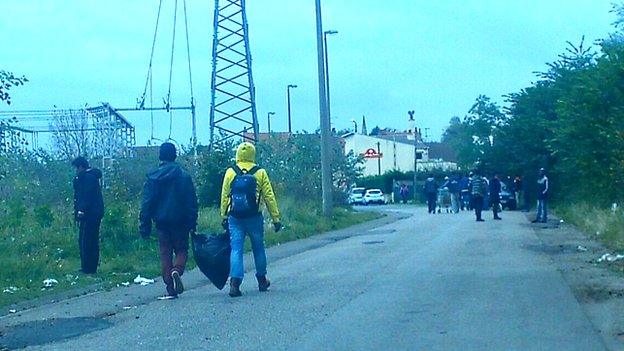
- Published28 October 2014
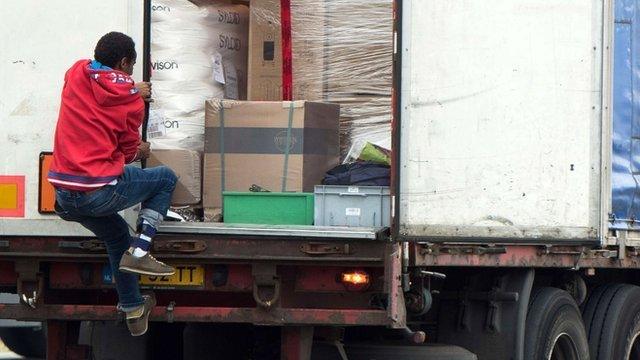
- Published23 October 2014
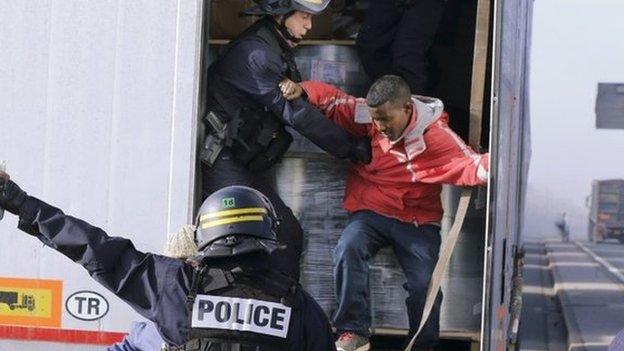
- Published9 October 2014
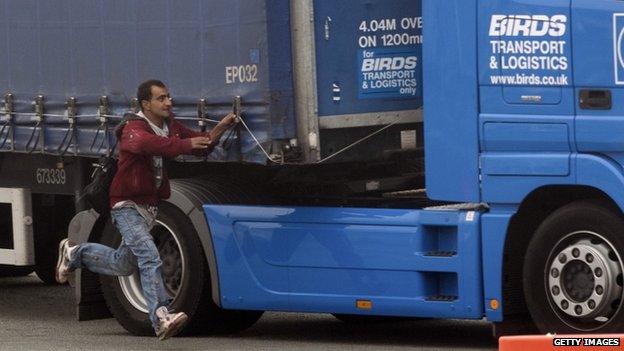
- Published20 September 2014
